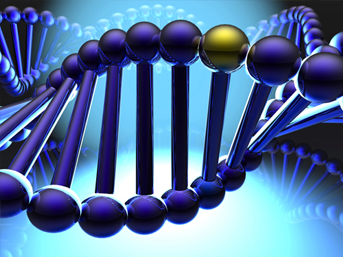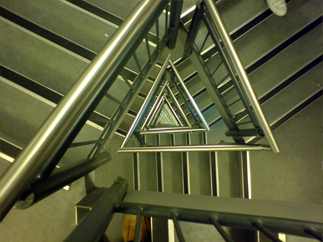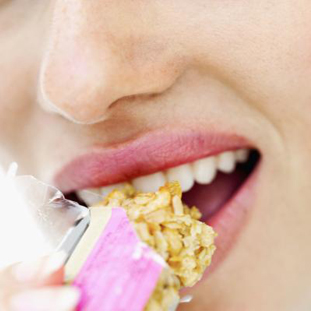By Victoria on April 19th, 2011
Study Finds Link between Genes and Yo-Yo Dieting
 If you’ve become frustrated because it seems like your weight is constantly yo-yoing, you’re not alone. In fact, scientists may have discovered a reason why so many of us put on the pounds after completing a successful diet: your genes!
If you’ve become frustrated because it seems like your weight is constantly yo-yoing, you’re not alone. In fact, scientists may have discovered a reason why so many of us put on the pounds after completing a successful diet: your genes!
A study, completed by the Maastricht University’s Department of Human Biology, found that a gene that regulates blood pressure may also be responsible for post-diet weight gain for women. In particular, this study found that women who had a tendency to quickly gain weight back following a diet had a higher concentration of a certain protein in their blood during dieting.
As a result of the study, researchers hope to develop a test that will identify people who are susceptible to weight gain following dieting. Before this study was conducted, there was no link between this particular protein and obesity.
A Test for Predicting Yo-Yo Dieting
Researchers, at this point, have no explanation for what they found, but they hope that within a few years, a test will be developed that will help identify individuals who may be at risk for weight gain following a diet. The protein researchers found to be responsible for weight gain, which is known as the angiotensin 1 converting enzyme, or ACE, is currently found through tests for blood pressure. Hospitals currently use a test to check activity for regulating blood pressure.
It is estimated that up to 80 percent of dieters suffer from weight gain following dieting, and the majority of those people return to their original weight within a year following a diet.
Details of the Study
The Maastricht University’s Department of Human Biology study followed 100 women, ages 20 to 45; half of the women in the study maintained their post-diet weight and half did not. Dr. Ping Wang, a scientist in the research group, published the findings of this study in the online scientific journal, PloS ONE.
How You Can Prevent Yo-Yo Dieting
Although a test to identify this protein is still a few years away, there are a few things you can do to fight the yo-yo dieting effect:
- Stay positive – Destructive thought patterns are the quickest route to failure, so it is important to change your mind-set about food and dieting. Make a conscious effort to control your eating and think about what you’re eating before putting anything into your mouth.
- Use mental imagery – Creating mental images is thought to trigger electrochemical changes in your brain that enable you to better translate your thoughts into action. Instead of simply saying, “I must take a walk today,” imagine yourself enjoying a walk in the sunshine, and chances are, you will be more likely to follow through on this action.
- Think positive – The best way to continue a positive pattern of eating is to think positive. Don’t let negative thoughts intercept your mind-set, as this is often the best way to ensure failure when it comes to maintaining your weight. Take the time to reflect upon your day and pat yourself on the back if you made good decisions that day. On the other hand, don’t beat yourself up if you had an “off” day; instead, make a promise to start fresh the next day and move on.
While there may be a genetic marker that can contribute to yo-yo dieting, know that your weight is still in your hands with a positive attitude and healthy lifestyle.
VN:F [1.9.17_1161]
Rating: 0.0/10 (0 votes cast)
VN:F [1.9.17_1161]
Share this story:
About The Author
I have always been interested in food and the effect it has on weight and the bodies overall well being, but it wasn't until I removed sugar, coffee and bad carbohydrates that I truly understood that you are what you eat!
By Victoria on April 15th, 2011
6 Common Myths about Diet and Weight Loss
 Thanks to books, television, radio and the Internet, there is a seemingly endless amount of information on dieting and weight loss. It is no wonder, then, why there are so many myths about these two topics floating around.
Thanks to books, television, radio and the Internet, there is a seemingly endless amount of information on dieting and weight loss. It is no wonder, then, why there are so many myths about these two topics floating around.
You want to shed extra pounds and maintain a healthy diet, but how you do begin separating the facts from the myths? Here we examine some of the most common myths about dieting and weight loss so you can become better educated when it comes to following a healthy diet:
- Myth #1: If you eat after dinner you will gain weight.
Fact: The truth is that your weight loss efforts will not be inhibited if you indulge in a meal beyond 8PM. Your body works by taking in calories and burning them, regardless of the time of day (or night).
- Myth #2: Fasting will kick-start any diet.
Fact: Any type of fasting automatically puts your body into “survival mode,” thereby actually slowing your rate of metabolism! The best way to keep your metabolism at its peak is to eat regularly. Plus, fasting usually results in intense hunger, which will ultimately cause you to overeat.
- Myth #3: Low-carb diets are more successful.
Fact: Although it may seem like losing weight is easier when you adopt a high-protein, low-carb diet, the truth is that people who follow these types of diets have a much harder time keeping the weight off long-term. In order to stick to a healthy diet and weight loss program, it must be sensible and reasonable, and eliminating entire food groups from your diet makes it incredibly hard to maintain in the long run.
- Myth #4: The best way to lose weight is to drink water when you’re hungry.
Fact: Although water will give you a sense of fullness for a short period, it is not a solution to hunger. Eating foods rich in protein and fiber is the best way to stay comfortable throughout the day and keep your blood sugar levels at reasonable levels so you don’t experience intense hunger and mood changes. Although water should be a staple of every healthy diet, nothing should replace healthy whole grains, vegetables, fruits and proteins in your diet.
- Myth #5: Exercising on an empty stomach burns more fat and calories.
Fact: Exercising on an empty stomach will not burn more fat and calories; in fact, it may do more harm than good because you aren’t supplying your body with the energy to burn calories. Plus, working out on an empty stomach will likely cause fatigue, thereby cutting a productive workout short.
- Myth #6: The best way to lose weight is to choose low-fat or fat-free packaged snacks.
Fact: Low-fat and fat-free foods may be lower in fat, but most of the time the manufacturer replaces the fat with sugar. Because the body turns excess sugars into fat, you may be doing more harm than good every time you indulge in one of these snacks. It is, perhaps, just as important to pay attention to the sugar content in foods as the fat content, as both of these ingredients can lead to weight gain.
Bust these myths, and you’ll be in a better position to lose weight and achieve your goals!
VN:F [1.9.17_1161]
Rating: 0.0/10 (0 votes cast)
VN:F [1.9.17_1161]
Share this story:
About The Author
I have always been interested in food and the effect it has on weight and the bodies overall well being, but it wasn't until I removed sugar, coffee and bad carbohydrates that I truly understood that you are what you eat!
By Victoria on April 14th, 2011
How to Squeeze Physical Exercise into your Day
 Our doctors tell us to get 30 minutes of exercise every day, but for most of us, that’s easier said than done. In fact, many of us are so discouraged by this seemingly impossible goal that we fail to exercise at all.
Our doctors tell us to get 30 minutes of exercise every day, but for most of us, that’s easier said than done. In fact, many of us are so discouraged by this seemingly impossible goal that we fail to exercise at all.
However, exercise doesn’t have to take place in one chunk of time each day. Instead, we can find moments throughout our day to squeeze in a few minutes of exercise. In other words, it may be easier to attain those 30 minutes of physical exercise than we thought. Here’s how:
- Take the stairs – It may be easier to hop on an escalator or elevator, but it will do your body good to take the stairs. Just walking up and down a set of stairs a few times a day will add up quickly when it comes to getting in your daily does of exercise.
- Move around during the commercials – Of course you should be able to watch your favorite television shows after a long day of work, but use those commercial breaks to your advantage. Simply sliding down onto the floor to do some legs lifts, crunches or push-ups will help you in your quest to achieve more physical exercise. Consider that a one-hour show has up to six commercial breaks! That is ample opportunity to get your exercise!
- Parking the car – If you live close enough to work to bike instead of drive, or if you have to make a pit stop at your local convenience store for a loaf of bread and you can walk instead of drive, why not? Although you may not be able to do this regularly, just switching up your routine once in a while and leaving the car at home will help you achieve your exercise goals.
- Park further away – The next time you head to your local mall or grocery store, don’t waste your time looking for the closest parking space. Park further away and use this opportunity to stretch your legs.
- Clean the house – Ten or twenty minutes of mild housework can get your heart pumping. Sweeping the floor, vacuuming the carpets or scrubbing the bathtub are all great ways to get moving. Plus, you have the added bonus of enjoying a neat and tidy home!
- Get in touch with your green thumb – A great way to enjoy a quiet afternoon and squeeze a little exercise into your day is to head outdoors and garden. From mowing the lawn to pulling weeds and planting flowers, gardening is a great activity that is good for both the body and the mind.
- Stand up while talking on the phone – Many of us are connected to our phones for the better part of the day because of work, so why not take advantage of this time to get a little exercise in your day? Simply standing up and either walking in place or walking around your office is a great way to get your heart pumping.
Exercising is easy when you look for smart, yet small windows to incorporate a little heart-pumping activity!
VN:F [1.9.17_1161]
Rating: 0.0/10 (0 votes cast)
VN:F [1.9.17_1161]
Share this story:
About The Author
I have always been interested in food and the effect it has on weight and the bodies overall well being, but it wasn't until I removed sugar, coffee and bad carbohydrates that I truly understood that you are what you eat!
By Victoria on April 2nd, 2011
Could Your Diet Actually be Sabotaging your Weight Loss Efforts?
 You think you’re following a healthy diet when you step onto the scale and discover you’ve gained five pounds! What’s going on?
You think you’re following a healthy diet when you step onto the scale and discover you’ve gained five pounds! What’s going on?
If you’ve found yourself in the same situation, you could very well be sabotaging your weight loss efforts with nothing other than your diet! Don’t let the small mistakes sabotage your diet.
Here are some of the most common diet mistakes you could be making every time you sit down for a meal:
- 100-calorie snack packs – Certainly, those 100-calorie snack packs are a great way to indulge in a little treat. The problem is that they are usually very small and leave us feeling less than satisfied. So what do we do? You guessed it: grab for another innocent snack bag. A better solution may be fresh fruit or cut vegetables with a little hummus or a handful of heart-healthy nuts. These types of snacks with fiber and protein keep us fuller longer, thereby staving off our hunger pains until dinner.
- Diet snacks – The “fat free” snacks you stock your pantry with may be doing more harm than good. Although the snack may be low in fat or free of fat, it likely has a ton of sugar to make up for the loss of taste. And, as we all know, our bodies turn sugar to fat. Instead of eating low-fat or fat-free cookies, for example, opt for a regular cookie (perhaps even one made with whole wheat or oatmeal for the fiber benefit), but limit yourself to one or two.
- Sugary drinks – Unless you’re drinking coffee, tea, diet soda or water, you’re taking in calories. In particular, sweetened fruit drinks and sodas can add hundreds of calories to your diet each day. Instead of drinking a fruit cocktail or even a large glass of orange juice, opt for water or skim milk and instead grab a piece of fruit; the fiber will keep you feeling full.
- Energy bars – Energy bars are a big market, and they are usually designed as a meal replacement. Although energy bars are usually packed with fiber and other essential nutrients, they are not low-calorie foods and probably should not be the first thing you grab when hunger strikes. Instead, use energy bars when you are too hurried to enjoy a healthy meal.
- Fat-free salad dressings – Fat-free salad dressings are not necessarily healthy. It is important to realize that fat-free dressings usually replace fat with sugar. If you are going to enjoy a large salad, skip the fat-free salad dressing and instead choose a salad dressing with heart-healthy oils, such as olive oil. Mix your own healthy salad dressing with olive oil, balsamic vinaigrette, and a dash of fresh ground pepper and salt, and your waistline (and heart) will thank you.
- Yogurt – There are plenty of reasons to add yogurt to your diet, but pay close attention to the type of yogurt you are choosing. Many types of flavored yogurt contain a large amount of sugar. The best way to enjoy the benefits of yogurt is to choose a plain yogurt and add fresh fruit to it.
Many seemingly “healthy” or “diet” foods may be wreaking havoc on your weight loss plans. By avoiding the pitfalls listed, you can more quickly be on your way to achieving your ideal weight.
VN:F [1.9.17_1161]
Rating: 0.0/10 (0 votes cast)
VN:F [1.9.17_1161]
Share this story:
About The Author
I have always been interested in food and the effect it has on weight and the bodies overall well being, but it wasn't until I removed sugar, coffee and bad carbohydrates that I truly understood that you are what you eat!
 If you’ve become frustrated because it seems like your weight is constantly yo-yoing, you’re not alone. In fact, scientists may have discovered a reason why so many of us put on the pounds after completing a successful diet: your genes!
If you’ve become frustrated because it seems like your weight is constantly yo-yoing, you’re not alone. In fact, scientists may have discovered a reason why so many of us put on the pounds after completing a successful diet: your genes!











